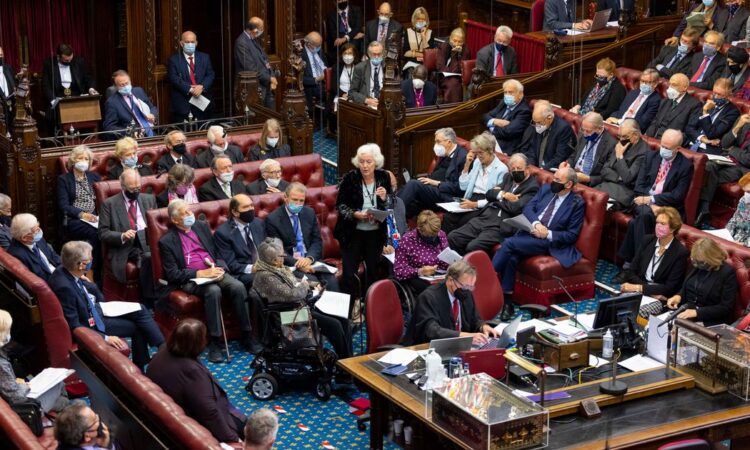
Community projects in Northern Ireland are facing a “cliff edge” as EU funding expires next week, while the UK’s replacement funding has not yet been allocated, the Lords heard on Tuesday.
Baroness Ritchie of Downpatrick, former leader of the SDLP, challenged the Government in the House of Lords over its failure to allocate equivalent cash for projects benefiting from the European Social Fund.
Her comments came as other peers said farmers risk falling in the “gap” between the end of European agriculture funding and the UK’s replacement schemes.
Read more: Loss of European Social Fund ‘will cripple communities and cost the government more in the long run’
Lady Ritchie said: “Many social economy projects in Northern Ireland have relied on the European Social Fund for many years.
“And, because that funding is due to end next week, they face a cliff edge because they have not received any communication about funding allocations from the UK Prosperity Fund to enable such social economy projects to continue with their good work right across the communities.”
She urged Treasury minister Baroness Penn to “ensure this funding is made available to such projects that do such good work for the benefit of all”.
Lady Penn responded: “I’m aware that there are elements of funding from the European Social Fund, which are due to come to an end at the end of this month in Northern Ireland.
“The Department for Levelling Up, Housing and Communities is administering a competition to replace that funding and they’ve received strong and positive response from organisations across Northern Ireland seeking to deliver on the aims of that programme.
“They’re working very hard to make the final selection decisions as quickly as possible.”
Their comments came as the House of Lords debated how the Government was matching capital that previously came from the EU, especially the European Structural and Investment Funds and European Agricultural Guarantee 2014-20.
The UK Government’s replacement schemes include the UK Share Prosperity Fund, which was allocated £2.6 billion in 2021 to “improve on the European Structural Funds by empowering local places”.
They also introduced farming and rural support worth a cumulative £3.7 billion annually over this Parliament and £33 million to support fisheries.
However, peers noted concern over a potential delay between the end of EU funding and the introduction of replacement funding.
Lord Kirkhope of Harrogate, former leader of the Conservative group in the European Parliament, said farmers and agricultural communities are seeing an “erosion of direct payments right now against a future sustainable farming incentive and their deep concern to keep food production at a high level”.
He said many local authorities and regions “had expectations for the new UK Shared Prosperity Fund, but that is not coming in for some time”, urging the Government to make sure “gaps will be filled”.
Tory peer Baroness McIntosh said the level of income from European funds for hill farmers and tenant farmers in particular are “falling faster than initially expected”.
Labour frontbencher Baroness Hayman of Ullock said: “The Government made a very simple promise to the nation and regions of the UK, as well as to farmers – the European funding would be matched pound for pound and the mechanisms used to allocate funds would be simpler and fairer.
“But several years on now, we are still waiting for the UK Prosperity Fund, environmental land management schemes and UK Infrastructure Bank to get fully up and running and to hit the targets they’ve set… Why is progress so slow?”
Lady Penn said: “As the EU funding falls away, the UK funding comes in to replace it and we are seeking to do that in as smooth a way as possible.
“When it comes to support for farmers, we will continue to set out our next steps on our environmental land management schemes, including the sustainable farming initiatives, countryside stewardship and landscape recovery.
“And with the Shared Prosperity Fund, that fund is ramping up as the EU funding falls away and it’s ramping up in a faster profile than previous EU funding had been distributing… That will reach £1.5 billion a year by the end of the spending review period.”
READ MORE:
For all the latest news, visit the Belfast Live homepage here. To sign up to our FREE newsletters, see here.






